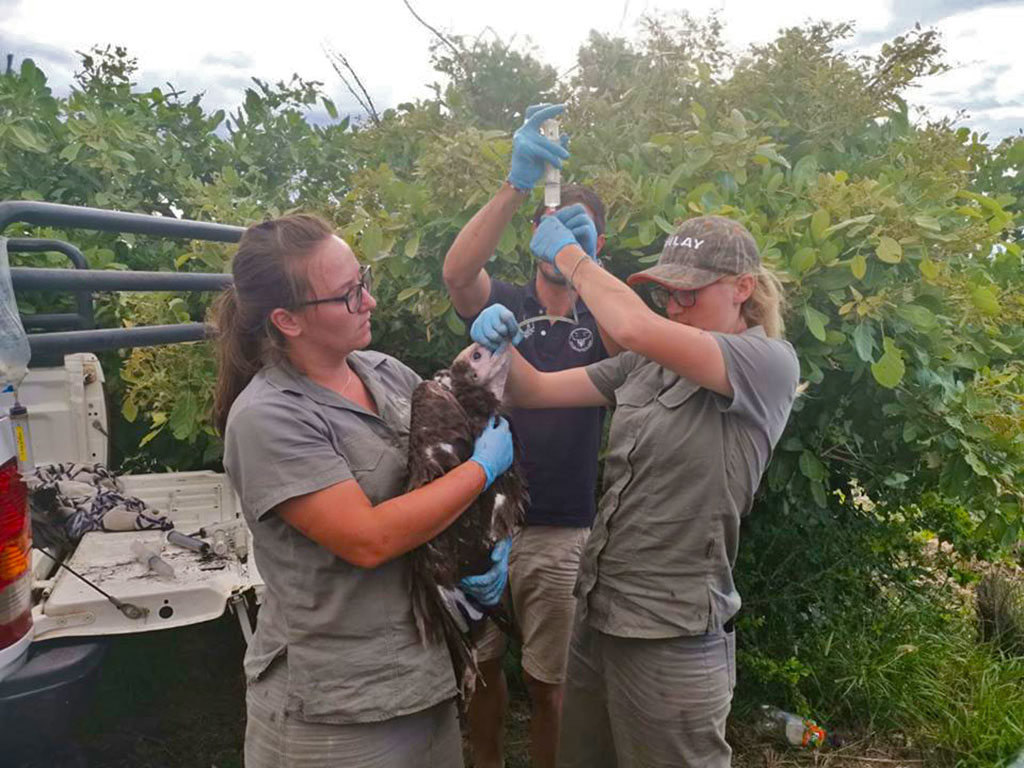Moholoholo Wildlife Rehabilitation Centre, situated in the Limpopo Province, has issued a statement to increase awareness around the poisoning of wildlife after a recent incident killed a number of mammals and 64 vultures.
Staff from the centre received an emergency call out in January after a mass poisoning (a dead donkey was laced with poison) at a game ranch four hours drive from the centre.
Initially, 50 vultures, 3 lions and one leopard were found dead close to the scene and three of the clinic staff loaded up bakkies with supplies syringes, tubes, towels and charcoal.
When the woman arrived on site, they found 25 vultures were still alive and treatment began immediately to try and save them.
‘It was truly a horrible site to witness, two bakkies full of weak and dying vultures… there were two lappet-faced vultures, one cape griffon, one white-headed vulture and 19 white-backed vultures and among them a tawny eagle was also suffering. One by one our staff managed to give the birds the treatment they needed and began to load them into our vehicle so that they could travel safely back to Moholoholo.’

Image credit: Moholoholo Wildlife Rehabilitation Centre/ Facebook.
Brian Jones, manager of Moholoholo said it’s the first time in over 60 years that he has witnessed all five vulture species that are found in Kruger (lappet-faced, cape, white-headed, white-backed and hooded) poisoned at one carcass.
In the days following the rescue, the rangers and wardens found five more white-backs, four tawnys, four lappets-faced and one hooded vulture dead in the veld. All were fatalities from the same poisoning. In the same week, 54 vultures were reportedly poisoned in Zimbabwe.
Birdlife Zimbabwe commented in a Facebook post saying ‘the African vulture populations cannot sustain such high losses as they are declining at an unsustainable rate. We need vultures alive! Vultures play a critical role in our environment by cleaning up carcasses that contain harmful diseases such as tuberculosis, rabies and anthrax. By doing this, vultures help prevent the spread of disease amongst humans and animals.’
According to the statement by Moholoholo, ‘The poisoning and poaching of our wild animal and birds in Southern Africa and the rest of Africa has become an extremely serious problem. It seems that it won’t stop until there are no more pangolin, rhino, vultures and eagles, elephant and lion left.’
The birds rescued and taken to Moholoholo took a week to get through the worst of it’. The vultures were all wing tagged and rings were placed around their legs before they were moved to an outside enclosure where they could exercise and rebuild their strength.

Image credit: Moholoholo Wildlife Rehabilitation Centre/ Facebook.
At the beginning of February, Moholoholo released all the birds that they were able to save and invited the public to witness the event.
A number of vulture restaurants have been set up, including one at Moholoholo and at the Victoria Falls Safari Lodge in Zimbabwe in an effort to draw vultures to these safe feeding centres and to try and protect them from poisoned meat.
‘At Moholoholo we have a vulture restaurant where we put out scraps from the rehab and we have been monitoring many species that visit each day for more than fifteen years,’ the centre staff told the Letaba Herald.
The numbers of vultures coming to feed at Moholoholo has been declining with only four vultures coming to feed recently when there is usually an average of 25 per day. There have also been no lappet-faced or white-headed vultures coming to feed and Moholoholo estimates that over 1,000 vultures were poisoned last year. ‘That is only what the Moholoholo team is aware of.’
You may also like
Related Posts
China’s National Health Commission has published a list of controversial coronavirus treatments that have animal...
read more
Warmer sea temperatures in the summer months, especially in February, were recorded and are believed...
read more
While people are stuck indoors due to the coronavirus pandemic, the penguins at the Two...
read more